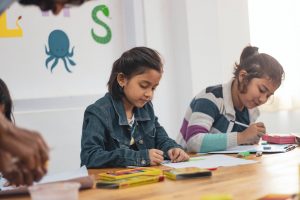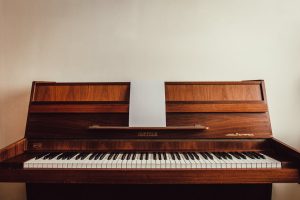
Are you looking for a great children’s activity that’s transformative, educational, worthwhile, and fun at the same time? Piano lessons fulfil all these requirements!
With hundreds of internally placed strings and 88 keys, a typical piano produces many unique tones and sounds. Moreover, learning to play this intricate system doesn’t only result in melodic music.
According to recent studies, enrolling your child in piano lessons equips them with the basic skills they will need from now until adulthood.
If you’re still skeptical about enrolling your child in a piano class, here are some reasons why your child should take piano lessons.
Promotes Focus, Concentration, and Patience

Any renowned pianist will tell you that learning the instrument requires perseverance, determination, and patience.
In a piano class, students must attentively take in all the instructions given to them by their piano tutor. This learning process teaches them basic skills that help them comprehend, listen, and respond to information.
Additionally, during a piano lesson, your child listens to instructions from their tutor in one language. Afterward, they must translate the given instructions musically by playing the different chords. Isn’t that pretty amazing?
Having the ability to concentrate for a long time while understanding the advantages of commitment and practice is vital.
Performing in Public Builds Confidence

Learning the piano boosts your child’s confidence significantly. Once they master a new trick or learn a new chord, it gives them some sense of accomplishment. At this time, you can encourage them to start practicing before audiences.
It doesn’t necessarily have to be the Singapore International Piano Festival (SIPF). A child can practice before family and friends to showcase their recently discovered skill.
When your child learns the piano, they gain the exposure needed to succeed in different activities, including public speaking.
Apart from raising their self-esteem, the piano helps them maintain optimism when they face a challenge.
Teaches Perseverance, Discipline and Develop Learning Skills

It goes without saying that disciplined people can make better choices and focus on lifelong goals. Playing the piano needs commitment and discipline, which benefits a child for the rest of their lives.
Children learn these characteristics as they set objectives and work towards achieving them.
When learning the piano, a child may likely perform in a band. Being part of a big performing group teaches children the importance of patience and collaboration because they have to take turns.
Similarly, learning the piano helps with a child’s overall confidence, concentration, and important aspects of learning and success.
Having these skills is vital for children because it helps them grasp concepts in subjects such as Science, Geography, and Math better.
Whether they are homeschooled or attend a regular school, these qualities will make a child perform well academically.
It Exposes Them to Different Cultures

One of the most transformative benefits of enrolling your child into piano classes is exposure to different cultures.
Music reflects the different types of history, hence, playing songs from various cultures and periods broadens their horizon. Having an expanded worldview is beneficial for children because children become open to encountering different ways of life and cultures. Experiencing a new way of life serves them well through the various stages of life into adulthood.
It Impacts their Mental Health Positively

Enrolling your child in piano lessons offers a whole set of mental health benefits such as feeling less stressed or calmer. This is because the brain loves new challenges and it always produces dopamine (the feel-good chemical) whenever it masters a new challenge such as playing the chords of a piano.
Encouraging your child to play the piano stimulates their brain and offers many advantages such as:
1. Increasing reading skills and vocabulary since when playing the piano, a student can differentiate the pitches, which helps them improve in distinguishing different spoken words.
2. Building better mental health and accepting constructive criticism
3. Learning how to avoid distractions.
4. Increasing the brain’s neural connections that develop higher mental power and help in focus and study.
Improves their Listening Skills

Piano lessons are the best way for your child to improve listening skills. People express their feelings in different ways such as facial expression and body language, tone of voice, and speech melody.
When children play different notes, they can better understand the meaning of different tones and how they make a vast difference, making them active listeners.
Children who attend piano lessons can differentiate the variations in the sounds, which increases brain development and neural activity.
It Makes them Productive

Introducing your child to piano lessons gives them something meaningful to do with their time.
When they play the piano, it improves their personality and encourages creativity such as making music.
This is a better pastime as compared to children sitting with their eyes glued to the television and watching a show passively.
In a piano class, children indulge in constructive activities such as practising their pieces, making music, among many other things.
It Provides a Wealth of Career Opportunities

There are plenty of misconceptions that music is a dead-end road in Singapore. Working as a professional musician is rewarding, so why not introduce your child to the piano at an early age? A piano is one of the most commonly learned instruments in Singapore because it’s a big industry.
Even if it would be difficult to acquire accolades like those of renowned local musicians such as Stefanie Sun or JJ Lin, there is a wide range of careers one can choose from when your child learns to play the piano.
Music education, producing, recording, and songwriting are some of the best available options.
Additionally, there’s a growing industry such as music therapy, an evidence-based approach that helps with autism, behaviour disorders, and Attention-Deficit/Hyperactivity Disorder (ADHD). A music therapist assesses the emotional well-being of a person before creating music that helps them deal with anxiety or manage stress.
Conclusion

There are many positive skills and habits that children who play the piano can develop because they learn much more than just music. They acquire valuable lessons such as memory skills, a sense of timing, mental concentration, and self-discipline that benefits them in every aspect of their life.
Additionally, research shows that playing the piano improves complex reasoning that helps build children’s self-confidence.
Give your child the chance to become the best version of themselves by enrolling them in a piano class!
